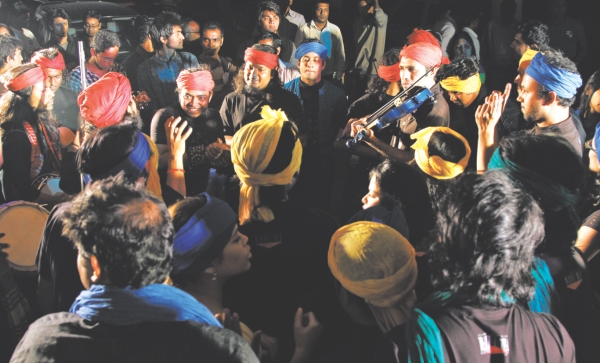| Home - Back Issues - The Team - Contact Us |
 |
| Volume 11 |Issue 09| March 02, 2012 | |
|
|
Theatre
Prachyanat's Pandora’s Box Tamanna Khan The invitation that came in brown paper spoke to the audience in first person, just as a friend would do. ‘Andarjatra’ Prachayant's improvisation of their work backstage, on occasion of their 15th anniversary, more than fulfilled the promises made in the invitation. Since its inception on February 21, 1997, Prachyanat has been well known for its experimental ways and regular theatre practice. Their first play a thirty minute skit, ‘Kadte Mana’ (Never Say Cry), written by a group member, Brindabon Das, was very well received by the audience. This inspired them to launch their full length production ‘Circus Circus’, which too received much accolades and ran for 68 nights. Raisa, a passionate theatre-goer, explains why Prachyanat's productions are different. She gives the example of the group's adaptation of 'The Rime of the Ancient Mariner'-‘The New Testament of Ancient Mariner’. “We could see from the audience how the background music was being created. For example to recreate the sound of a storm they were moving x-ray plates in front of the microphone. The sound of the sea around the ship was made by moving water bottles in front of microphones. It was all done live,” says Raisa. The founder members of Prachyanat, who came from Aranyak and Theatre Centre, did not want to start yet another conventional theatre group. “We wanted to make this a theatre group with international standards, which would work well in the country as well as compete with foreign works,” explains Tawfiqul Islam Emon, a founder member of Prachyanat. One aspect of Prachyanat that appeals to young aspiring artistes is its school — Prachyanat School of Acting and Design. Established in July 2001, the school offers six-month long courses on theatre, acting, design and music. Reetu Sattar, another member of Prachyanat opines that their objective is to inspire students to become true artistes in whichever fields of arts they have interest in. We believe, says Reetu, that only when one excels in the field of art one is passionate about, s/he gains the ability to do experimentation in that field.
Prachyanat has nevertheless succeeded in the effort as evident in Ruhul Amin, a young, new member's comment. He looks with surprise when asked whether he minds selling tickets instead of performing. “This too is a part of the performance. Even when I make tea that too becomes a part of the performance.” He explains that they do everything themselves. “We even have our own music team. We do everything ourselves starting from cleaning to other works related to a production,” he adds. As such we do not teach any form of arts,” Reetu asserts. She claims that students are rather, introduced to all the different sections of theatre and media, so that at the end of the course they can choose their preferred path. Throughout the duration of the course, students also get the opportunity to participate in a street and a full-length production. The establishment of Prachyanat School of Acting and Design provides the group with a constant flow of performers and partial financial support. Prachyanat now recruits new members only from among the students who complete the six-month certificate course. This way the interruptions caused during a show by irregular members are easier to deal with. Prachyanat recognises the important role that the audience plays in the survival of theatre arts in Bangladesh. Thus the group has taken initiatives to promote theatre practice and create an audience. “We stage shows in different schools whereas the plays are written for children but performed by adults,” Emon says. The students are also encouraged to pay their tiffin-money to watch the shows. “This is like a practice that if the students pay Tk 10 for tickets then they will grow a tendency to watch theatre,” Emon adds. To bring theatre practice in Bangladesh to professional levels, Prachyanat is also exploring other venues. “We have not been able to bring the corporate society near theatre,” says Emon. He points out how band groups easily get corporate sponsor when compared to theatre troupes. “We, at Prachyanat, are trying to attend the corporate events. By launching their events through theatre performances, we are trying to communicate how strong a media theatre is and how it can be used effectively,” he asserts. Emon believes that Bangladeshi theatre art cannot solely survive on government funding and subsidies. It needs to incorporate other segments of the society. Keeping pace with the demands of a constantly changing world, Prachyanat's members look forward to give their troupe a more institutional framework. Prachyanat thus continues its work of not only creating theatre performers but passionate theatre artists, enthusiasts and connoisseurs.
|
Copyright
(R) thedailystar.net 2012 |

